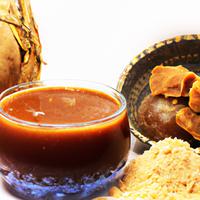
1 serving (250 grams) contains 150 calories, 0.0 grams of protein, 0.0 grams of fat, and 38.0 grams of carbohydrates.

Log this food in SnapCalorie

Nutrition Information
Calories |
141.5 | ||
|---|---|---|---|
% Daily Value* |
|||
| Total Fat | 0 g | 0% | |
| Saturated Fat | 0 g | 0% | |
| Polyunsaturated Fat | 0 g | ||
| Cholesterol | 0 mg | 0% | |
| Sodium | 9.4 mg | 0% | |
| Total Carbohydrates | 35.8 g | 13% | |
| Dietary Fiber | 0 g | 0% | |
| Sugars | 33.0 g | ||
| protein | 0 g | 0% | |
| Vitamin D | 0 mcg | 0% | |
| Calcium | 18.9 mg | 1% | |
| Iron | 0.5 mg | 2% | |
| Potassium | 47.2 mg | 1% | |
* Percent Daily Values are based on a 2,000 calorie diet. Your daily values may be higher or lower depending on your calorie needs.
Food Attributes
Source of Calories
About Palm sugar juice
Palm sugar juice is a naturally sweet beverage made by dissolving palm sugar in water, often enhanced with lime or other flavorings. Palm sugar is derived from the sap of palm trees, commonly found in Southeast Asian cuisines, particularly Thai, Indonesian, and Indian cooking. Rich in flavor, palm sugar provides a caramel-like sweetness with a subtle earthiness. The juice retains trace minerals such as potassium, magnesium, and zinc, though these amounts are modest. Compared to refined white sugar, palm sugar has a lower glycemic index, making it a favorable sweetener for managing blood sugar levels when consumed in moderation. However, like all sugary drinks, excessive consumption may contribute to increased caloric intake and potential health risks such as weight gain. Palm sugar juice combines cultural authenticity with a natural source of sweetness, offering balance as an occasional treat or accompaniment to tropical dishes.



